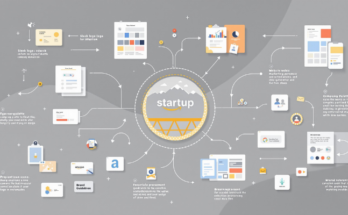The situation was always a heads down race and many startups/angel investors or venture capitalists were on a lookout for the next disruptive idea that can bring the revolution. However, there seems to be minuses in the likelihood of unearthing the next unicorn; a private startup company worth over $1 billion, there are nevertheless a plaque or two of prospective startups. In this article, you will learn about ten more such startups that are ready to shake the markets of their niches.
1. Notion: A strong, unified, all-round application.
Notion was launched in 2016 by Ivan Zhao and Simon Last and has been the go-to-productivity application for the young tech titans of the twenty-first century, with such clients as Pixar, Nike, Tencent, etc. Notion is an all-in-one workspace aimed at making team work more effective, tracking tasks, and unifying all the relevant data into one platform. Its basic capabilities encompass the fact that its interface is empty in a way, giving users complete flexibility in organizing interfaces according to their prescribed requirements.
One of the biggest advantages of Notion, and what makes it stand out among other project management platforms, is integrality. The users can build his/her own database, kanban boards and calendar, and wikis and can use all simultaneously on the same page. Notion is another plan alternative to Asana and Trello with main features but with more customizable and creative look. Notion is living up to its mission of disrupting the way teams work with the recently closed Series A funding round and growing team.
2. Lime: Of shared transportation, electric scooters, and bikes
And read on to find out how Lime Inc has turned the sporting landscape upside down with shared electric scooters and bikes in over a hundred different cities around the world. Most of the users of Lime’s brightly colored, instantly recognizable scooters and bikes are those who need to travel a few miles, shifting from cars to electric transport.
Yet, Lime has expanded such features as helmets and locks to its scooters, and many cities have prohibited or limited these devices on safety concerns. In addition, today the company is actively seeking to increase coverage and cooperate with city administrations to retain the leading position in the developing micromobility market.
3. Fortinet: Security measures for the world full of interconnected systems
With the rise of globalisation, the need for security has never been more important especially in the world of technology. Being one of the first players in the cybersecurity market, Fortinet contributes to the fulfillment of this need and can boast a wide range of the highest-quality cybersecurity solutions for businesses of various scales.
As a provider of firewall, intrusion prevention and secure wireless LAN solution, Fortinet provides the clients with comprehensive security over their networks. It offers the AI-driven security service called FortiGuard which provides threat intelligence as well as the protection in real time, and FortiSandbox which receives threats identification in real time manner. Currently, Fortinet is an innovator firm within its sector and has thus demonstrated commitment to delivering secure solutions against ever-evolving threats.
4. Canva: A cult for simplified process of graphic designing
It is changing the way people design graphics with available software as it provides simple clickable buttons to develop posters, presentations, Social Media Graphics or any other designs. Launched in 2013 by Melanie Perkins and Cliff Obrecht alongside Cameron Adams, Canva is an online graphic design tool that has taken the market by storm by providing businesses and individuals credible designs for their marketing needs without prior design know-how.
The reason that teams enjoy using Canva is because of how many pre-built templates, photos, and fonts that Canva has, and the collaboration tools they provide. With the favorable growth and increased user base and its series B round funding, the platform was well poised to further disrupt the graphic designing market.
5. HelloFresh: Meal kit delivery service
HelloFresh was launched in 2011 by Thomas Griesel and Dominik Richter to deliver ready meals that are easy to prepare and healthy for consumption by clients who would rather cook at home than order take out foods. Since its launch, HelloFresh has grown rapidly and is now present in 12 countries of three continents and serves more than 3 million active clients.
The competition in the meal kit industry has risen and several other companies are into business to gain the market share. On the other hand, HelloFresh places a lot of emphasis to customers and is constantly evolving, because of this it has remained a step of ahead of its competitors. Since the global populations’ concern for healthier foods continues to be on the rise, HelloFresh is poised to cement it place in the meal kit market.
6. Robinhood: Commission-free stock trading
Launched in 2013 by Vladimir Tenev and Baiju Bhatt, Robinhood, based in Californial is an investment application for investing in the stocks whose operations changed the conventional stock trading business by removing its high fees. The unconventional business model of free stock trading without commission has created a massive appeal for millions of users making it currently serve over 13 million clients at Robinhood.
As of recent events, Robinhood has been tested with controversies in relation to how it has managed the volatility in the stock market; the app stands firm as one of the best investment and stock trading applications out there. As people chase cheap investment avenues, Robinhood is well placed to keep on frustrating the traditional stock trading environment.
7. Stripe: Online payment processing
Stripe, launched in 2010 by John and Patrick Collison, is changing the way individual and companies accept payments online. Through an API and a simple Web interface, Stripe helps businesses accept credit card and other online payments from innovative customers.
The emphasis on innovation, security and simplicity have seen stripe become the most popular option with over one hundred thousand companies using the platform. Entrance into new markets and its latest funding round show that the company is poised to keep on shaking up the online payment processing sphere.
8. Airtable: The best of both worlds, an amazing spreadsheet database
Airtable is an electronic workspace that mixes the simplicity of a spreadsheet with the capabilities of a database. Airtable was started in 2012 by Howie Liu, Andrew Ofstad, and Emmett Nichols Airtable has been well received and now has over 80,000 customers who pay to use it and has partnerships with IBM, Salesforce, and Google.
Airtable is on a rare boom due to its simplicity and efficiency for work for any team or business. With its Series C, growing customer list, Airtable still has ample opportunity to disrupt the spreadsheet/database market in the same way.
9. Toast: Management of restaurant software
Toast, started in 2011 by Aman Nathi, Steve Fredette, and Jonathan Grimm, is an all-encompassing restaurant management tool that includes POS systems, online ordering and staff scheduling. Toast’s focus on creating a complete solution has turned into its key selling point – Toast is used by over 20,000 restaurants in the United State.
With the ongoing advancements in the restaurant business through technological influence, Toast continues to occupy a strategic position by recently closing its Series F funding round, and launching in Canada.
10. Glovo: An on-demand delivery service
Glovo is an application for instant delivery, service developed in 2018 by Sacha Michaud, Andre Challal, and Maxime Wijnakker with the delivery of food orders and grocery delivery, and pharmaceuticals and other goods purchases locally. Based on this assertion, Glovo has developed its services in over 200 cities across eight countries which makes it one of the most competitive players in the gig economy market.
Due to its fast growth and flexibility to adapt to the markets, Glovo stands the chance to retain its dominance in the on-demand delivery market. Looking at the ever increasing society need for convenience coupled with urge for quick delivery, Glovo had positioned itself in a right place and right time with continued negative disruption of the traditional way of shopping online.
Conclusion
Who knows what is the next big startup idea waiting to be implemented – the ten listed here all seem to have the chances of seriously disrupting their respective markets. These new entrants are strategic and viable in their according markets due to their unique products, increasing user groups, and secure financial support.
Our contemporary startups such as Notion, Lime, Fortinet, Canva, Hello Fresh, Robinhood, Stripe, Airtable, Toast and Glovo are the global pioneers and game changers as the world proceeds deeper into the twentieth-first century. Whether or not any of these startups will evolve into the next unicorn remains to be seen, but currently they all provide exciting advancements in their fields, and thus are worthy of future attention.




